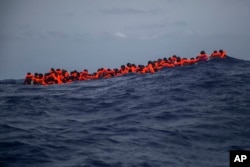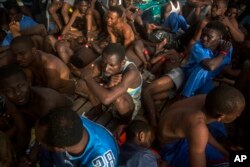Improvisation and abrupt policy announcements aren't exclusive traits of U.S. President Donald Trump — his French counterpart, President Emmanuel Macron, has surprised fellow European leaders all week with foreign policy statements, mostly concerning Libya, that have left some fuming and the Elysee Palace floundering.
On Friday, French officials had to walk back Macron's announcement about setting up "hotspots" in Libya to process asylum-seekers to stem the flow of migrants to Europe. And he told reporters he would do so “with or without” European Union approval, saying he intended to set up the centers this summer.
The announcement earned the rebuke of Italy’s foreign minister, who said “France can't move forward with improvised lines.”
The European Commission issued a muted statement, with spokeswoman Natasha Bertaud saying the Commission would need time to “define exactly what is being proposed.” Behind-the-scenes, EU officials were scathing, with one telling VOA that this was another one of “Macron’s Trump moments.”
Within 24 hours, the Elysee Palace started to temper Macron's "hotspots" announcement, saying variously he’d been misquoted or misunderstood, or that the announcement — made at a refugee facility in the French town of Orleans — was “premature.”
Risk of abuses
Rights organization expressed alarm about the plan. Human Rights Watch said it was dangerous to try to process asylum-seekers’ requests in Libya. “[This] carries the risk of human rights abuses," warned Judith Sunderland, the group’s associate director for Europe.
But Macron’s ideas were not hedged with caveats. He said France will vet asylum-seekers in Libya — he estimated there are 800,000 migrants waiting in the north African country ready to cross — before they embark on the perilous Mediterranean crossing to Europe.
"The idea is to create hotspots to avoid people taking crazy risks when they’re not all eligible for asylum. We'll go to them,” said Macron.
The French leader said that migrants were destabilizing Libya and Europe by fueling human trafficking, which in turn funded terrorism and the militias. According to the French news agency AFP, he noted “other European countries are very reluctant” and that France would “do it” even without the EU.
His officials indicated the plan was impractical, however, while Libya remains split between three competing governments, buffeted by dozens of militias and rival warlords.
Macron's office insisted he was being misunderstood and that the president only wanted asylum requests processed as close as possible to the migrants' countries of origin in sub-Sahara Africa, not necessarily in Libya.
That explanation was welcomed by the Italian foreign minister, who earlier this week complained publicly about a meeting Macron brokered in Paris between rival Libyan leaders, which had not been coordinated with either Rome or Brussels.
Popularity slump
Italian frustration with Paris grew on Thursday when Macron decided to nationalize, at least temporarily, a French shipyard in western France to block a takeover bid by the Italian state-owned company Fincantieri. The takeover was due to go into effect on Saturday.
The STX shipyard, currently majority-owned by a South Korean company, builds not only passenger vessels, but also warships. French opponents of the takeover have highlighted Fincantieri's links with China, warning that sensitive French know-how could end up in Chinese hands, something that did not trouble Macron’s predecessor, Francois Hollande. The blocking move was described by Italian Prime Minister Paolo Gentiloni as “serious and incomprehensible.”
Macron’s French critics argue his abrupt policy announcements are a response to his slumping popularity. In just two months since the 39-year-old former banker took power, he has seen his popularity rating fall by ten percentage points — the biggest decline for a new president since 1995.
The president’s defenders say at least he’s trying to come up with fresh ideas — especially when it comes to the migration crisis roiling Europe and the linked problem of a lawless Libya. They point to a raft of policy proposals on the migration crisis from other European states, including Italy, that have gone nowhere. The latest from Rome is to send Italian warships to help Libya's coast guard combat people smugglers.
Gentiloni said Thursday that the move could be a “turning point” in the migrant crisis. This year 100,000 migrants mainly from Africa and South Asia have arrived in Italy. More than 2,000 others have died at sea.
But Italian lawmakers have to approve the mission — which has been coordinated with the EU Commission — and opposition is rising. Some express concern that sending back migrants from their launching point may breach international humanitarian law. Others worry that the Libyan coast guard can’t be trusted, asserting that some in the coast guard are in league with traffickers and others are controlled by militias.
Right groups also are alarmed at European government thinking that favors blocking asylum-seekers in Libya, where they are vulnerable to abuse.
"Handing people over to militias that collude with the smugglers and traffickers" would violate humanitarian law, said Human Rights Watch's Sunderland.












